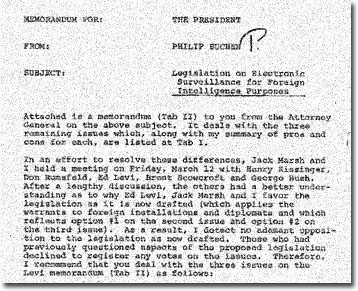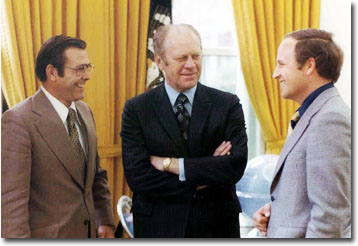FreeRepublic On FISA 11/30/2000 (A Trip Down Memory Lane)
| (Cross-posted here, on DailyKos.) Lately on RedState, they've been pushing this "biggest WMD story of all time," with regards to Iraq and intel, that's going to be released at the Intelligence Summit on Feb. 18th, 2006. I covered this a little while ago in a diary entitled New WMD Evidence Surfaces. Well, I saw someone at RedState drop a comment about it again and so I started doing some Googling to find some more info on this Intelligence Summit. What I found was...almost eerie. Found at FreeRepublic. Yes, I'm probably quoting way more than I should but A) I'm saving you the trouble of visiting FR but more importantly B) shit like this ought to be pointed out. Seven judges on a secret court have authorized all but one of over 7,500 requests to spy in the name of National Security. They meet in secret, with no published orders, opinions, or public record. Those spied on May never know of the intrusion. Now, Clinton has expanded the powers to include not only electronic, but physical searches. Clinton. Why am I not surprised to see his name... Since its founding in 1978, a secret court created by the Foreign Intelligence Surveillance Act (FISA rhymes with ice -a) has received 7,539 applications to authorize electronic surveillance within the U.S. In the name of national security, the court has approved all but one of these requests from the Justice Department on behalf of the Federal Bureau of Investigation and the National Security Agency. Each of these decisions was reached in secret, with no published orders, opinions, or public record. The people, organizations, or embassies spied on were not notified of either the hearing or the surveillance itself. The American Civil Liberties Union was not able to unearth a single instance in which the target of a FISA wiretap was allowed to review the initial application. Nor would the targets be offered any opportunity to see transcripts of the conversations taped by the government and explain their side of the story. Wait...you mean...we should give them access to materials that might provide in their defense? We want to provide them with tools to get out of trouble? Get ready for one hell of a kicker. I bet you didn't even see this one coming, either. Granting new powers to the FISA court was accomplished quietly and treated as a non-event in the national media. The lack of reporting was somehow fitting, though, following as it did the silent debate last year when Congress rubberstamped the annual Intelligence Authorization Act. What else do we have here? Hmm... Physical searches to gather foreign intelligence depend on secrecy, argued Deputy Attorney General Jamie Gorelick. If the existence of these searches were known to the foreign power targets, they would alter their activities to render the information useless. Gorelick went on to explain that A [traditional] search can only be made when there's probable cause to believe a crime is involved, whereas a national-security search can be made at a substantially earlier stage. We often don't know what we're looking for when we go in, she observed. and... The possibility of FISA-sanctioned fishing expeditions was only one of the potential abuses that alarmed legal scholars and people concerned with civil liberties. It's absolutely ripe for abuse, said New York City defense lawyer Ron Kuby. There are hundreds of solidarity groups that American citizens work with, and all of those groups could be targets under FISA. 16 These groups and individuals, engaged in legitimate dissent and solidarity work with the victims of U.S. foreign policy around the world, fear that their First and Fourth Amendment rights will be eroded. Let's see...what else... The Supreme Court, however, has never endorsed the concept of a national security exception for physical searches. In 1972, it ruled that the Fourth Amendment prohibits warrantless surveillance of domestic targets. The Court specifically warned that the danger to political dissent is acute where the Government attempts under so vague a concept as the power to protect `domestic security.' It continues... In another case, people not themselves targets of a FISA-authorized telephone tap were hauled into court for having the misfortune of calling somebody who was under electronic surveillance. In 1988, after activists Vernon Bellecourt, Bill Means, and Bob Brown phoned a member of the Peoples' Committee for Libyan Students, they were ordered to testify before a grand jury investigating the group. When the three men refused to cooperate and testify even with immunity, they were slapped with a citation for contempt. James Cacheris was one of the federal judges who issued that citation in support of the FISA warrant. Five years later, he was appointed to the secret court. The comments are even better, though. comment This is beyond frightening. Thank you for this find. comment This does not bode well for continued freedom. This one made me laugh out loud. comment Any chance of Bush rolling some of this back? It sounds amazing on its face. Why didn't Wen Ho Lee just "disappear" into one of these Star Chambers, never to return? Wait! Wait! It's getting better now. comment I don't see that as a possibility. This is wherein the danger lies in the precedent set by the Clinton criminal administration. God only knows who will be in power next, but there are no checks and balances anymore. This is exactly the SORT of thing I've been protesting all along. Libs just don't see this! God forbid it gets too easy to get one of these warrants. comment Good question! Don't you remember? When the FBI asked Reno to get surveillance authorization for Lee from the FISA court, Reno refused. In fact, as a result of the China "spy scandal", Congress is currently working on legislation to make it even easier for the feds to get FISC warrants. Something like this...why...could surely be abused! comment This is one of those ideas that has a valid purpose behind it, but is wide open to terrible abuse. And there's no way to check to see if it is abused. Thank god we still have Congressional oversight, right? comment Dog Gone, the article doesn't seem to say, but isn't there a Congressional subcommittee in charge of overseeing these operations? Or is Congress just passing the bills then turning its collective back? Denies info to the White House? I thought it was the other way around. comment Congressional oversight of ALL intelligence issues is virtually non-existent. The intelligence community routinely denies information even to FBI and White House...... when Congress makes demands they just smile and wink at one another. And god forbid there's activities like spying directed at harmless, innocent American groups, right? comment The targets need not be under suspicion of committing a crime, but may be investigated when probable cause results solely from their associations or status: for example, belonging to, or aiding and abetting organizations deemed to pose a threat to U.S. national security. My the hypocrisy is thick in these here parts. Now, by no means am I surprised by this. Here we see conservatives voicing concern about the very thing we're raising issue about. Yet this time around, it's the war on terror, liberals hate America, we're traitors, Ann Coulter is a truth speaking deity, terrorism calls for "unprecedented" actions against "unprecedented" enemies and there are no limit to how far the government can, will, and is legally permitted to go to protect it's citizens, right? So why was this wrong when Clinton did it, as it seems they're saying, but it's ok now when Bush does it? Do these people not remember their own words? Could someone please explain this one again to me? Other than that, I hope you all enjoyed this little trip down memory lane. |


